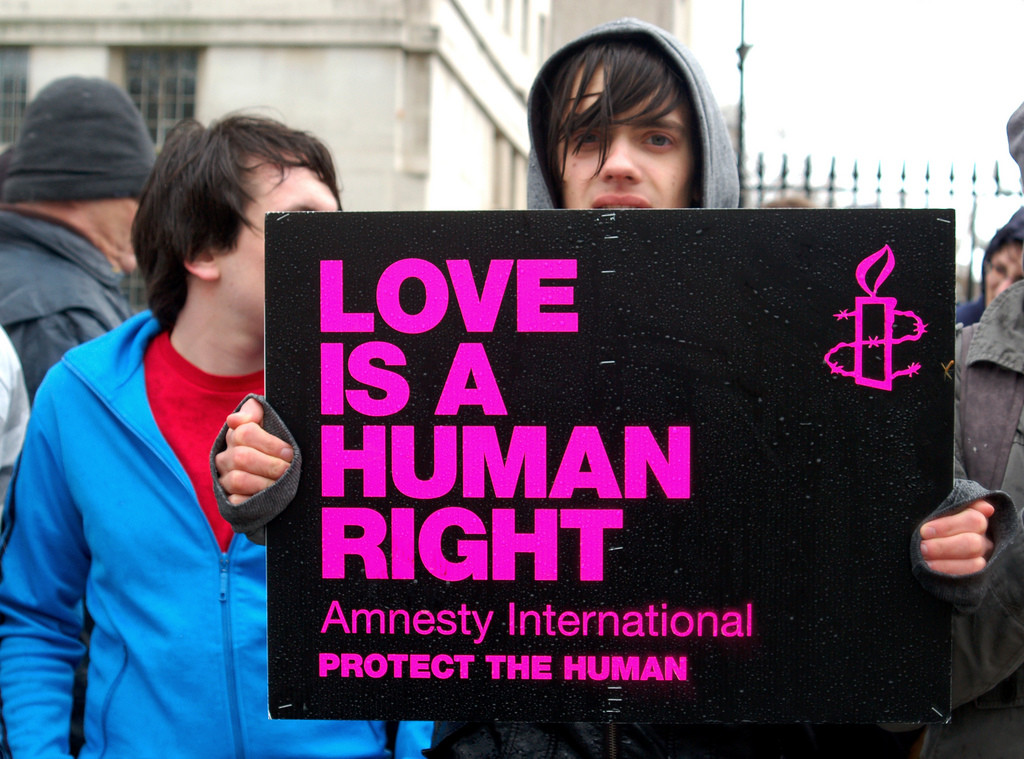The attack on Human Rights is an attack on those who sorely need them

In 1998, under the Labour government, parliament passed the Human Rights Act, enshrining the European Convention of Human Rights (originally signed in 1950) into British Law. David Cameron and the Conservative Party intend to scrap the Human Rights Act and Replace it with a ‘British Bill of Rights’. This is something that’s been on their manifesto for a long time – they were prevented from enacting it in the last parliament by the Liberal Democrats; now that they have a majority, they will steam ahead.
Cameron claims to respect the 1950 Convention. So, what does he want to do? You can read a summary of the Conservative policy here.
There is one particularly disturbing aspect of this policy: it limits human rights to British soil, only fully protects the rights of British citizens, requires that protecting human rights be cost-free, and lays them by the wayside when given any intelligible reason that a sane, kind person might want to override them.
In my view, this policy recasts the concept of ‘human rights’ in a disturbing way relative to the European Convention that it claims to respect.
The British soil criterion is explicitly stated: One of the purposes of the policy is to: “Limit the reach of human rights cases to the UK, so that British Armed forces overseas are not subject to persistent human rights claims that undermine their ability to do their job and keep us safe.” Similarly, in a speech in October 2014, Cameron derided “The suggestion that you’ve got to apply the human rights convention even on the battlefields of Helmand.”
The idea that the human rights of British Citizens will be protected more than others crops up in several places.
For example, Cameron wants to be able to deport ‘foreign criminals’ even where this involves tearing them away from their families. Let’s pause here to think about what this means. In many cases, this would involve taking them away from their children; I have worked with an individual, now in their 30s, who came to Britain as a child and has lived here legally ever since. They were convicted of a minor entirely non-violent offence and imprisoned. Upon ‘release’ they were issued with a deportation order to force them back to a country they knew nothing about, where they knew no one and didn’t speak the language, away from their children and partner; they were moved directly to immigration detention.
It is already far too easy to deport ‘foreign criminals’. This individual’s lawyer argued that they had the right to stay here, with their children, and all their family, in the country in which they had lived since childhood on the basis of the right to family life enshrined in the European Convention of Human Rights and the Human Rights Act. David Cameron wants to make it very, very difficult to make this argument.
Both of these limitations – the ‘British Bill of Rights’ will apply only in Britain and the rights of foreign nationals will not be inalienable – imply the third: that human rights don’t apply when the going gets (at all?) tough.
In this model, human rights are not intrinsic to human nature. This raises a fundamental question about what we are trying to talk about when we talk about human rights, and what we are trying to protect when we invoke them.
Human rights discourse is an attempt to articulate intrinsic human value, and has implications for how we behave towards each other.* Thus the European Convention quite deliberately sets out absolute rights – as the Conservative policy explanation rightly notes.
In fact, this is a discourse designed to be applied especially in extremis, not abandoned at that point. This is a way to limit maltreatment of human beings in situations in which there might be reasons for maltreatment – one might need information that could be obtained by torture, for example. In restricting rights to situations in which respecting them is easy and making rights of foreign nationals alienable, this policy makes a qualitative, rather than simply quantitative alteration to the concept of rights so that they are no longer about intrinsic human value. They are about factoring the claims of decency and compassion into a much wider calculation in which they may be outweighed by many others. If this is so, the discourse on rights becomes devoid of meaning.
The racism of the proposed new approach is painfully clear, and we should be on our guard for an even more intense attack on the immigrant population.
It also has extremely dangerous implications for Conservative economic and welfare policy. As foodbanks continue to grow, and more and more families are pushed further into abject poverty, it is clear that welfare cuts are a human rights issue: they are about the intrinsic value of the human being, which is violated by a government who would rob the poor to give to the rich.
Cameron is wary of challenges to his policies from a human rights perspective. He wants to be able to make the need to feed one’s children simply one factor, to be considered among many, that has no overriding power and is given no particular priority.
___
*A number of people on both the right and the left have questioned the language of rights as a good way of talking about intrinsic human value. I happen to think that the language of rights is a good way of doing this that gets at something true and important; however, I think that those who disagree with me on this point can still join me in lamenting the move away from a focus on intrinsic value that this new policy represents. It is sometimes objected that the discourse on human rights is entirely subjective. This is what I hope to guard against.




RoughSleeper: We need it made illegal for anyone, or Pariah governments, to gather our data, without our specific fully ‘informed consent’.
So, only the terrorists and criminals should have the advantage over the security services as I can’t see that any Jihadist is likely to agree to being monitored, can you? As for the Human Rights law, scrap it and introduce our own British Bill of Rights while leaving the EU.
You need to look at the bigger picture.
GCHQ needs powers to spy on the publics every communication for complete state control. External uncontaminated oversight, and justice, prevents this. Therefor scrap it, and have malleable internal justice instead.
Taken together with the Snooper’s Charter, and mass surveillance, would give them access to a totally blackmailable, and therefor malleable, Judiciary, political, & police, system. We saw the results of their past endeavours of this in ‘Operation Westminster Coverup’. It would happen again.
Human Rights, and their data protection, are absolutely linked.
We need it made illegal for anyone, or Pariah governments, to gather our data, without our specific fully ‘informed consent’.
As has been pointed out by many, we all have our personal details to hide: Bank details; Passwords; Personal life correspondence; Love letters; Letters exposing state institutional abuse; Case preparation ‘privileged correspondence’; Correspondence to HR groups; Pro democracy groups; Political parties; Votes; Thoughts; Books we are writing; Patent Designs; Songs; Art; Intellectual Property; Industrial designs; Research; Mineral deposit locations; etc. Phone calls on the previous subjects…………..Maybe, even affairs.
This is our privacy. Our personal lives. Our network of family & friends. Our thoughts; Our future recompense for years of hard work. Our HUMAN RIGHTS!
State scrutiny of our inner lives is not democracy:
http://www.theglobeandmail.com/globe-debate/state-scrutiny-of-our-inner-lives-is-not-democracy/article15839102/
Has the State got things to hide? They don’t allow us to monitor, behind their walls, by camera, microphone, or in person, their cover ups, ill treatment of prisoners, or what they conspire to do against the public. Yet they should be accountable to the public.
Without such protection, we wouldn’t have ‘a representative ‘form of’ democracy’ at all. We would have a set of lip service MPs that can be encouraged to stray by a state; monitored; then that stray temporarily covered up, until they needed the MP’s vote to be ‘right’, in a ‘Human Resources’ program. Whether it be expenses, affairs, abuse, speeding, non executive directorships, payoff’s, or fraud.
He is not only open to blackmail from his own state, he is open to blackmail from foreign powers. Foreign powers that could blackmail our state to do their bidding; Fight their wars; Abolish all Human Rights, and privacy, for it’s people, so that they could monitor more of the worlds people from its territory, instead of their own; Increase their power over the world. Rule!
Human Rights, and their data protection, are absolutely linked.